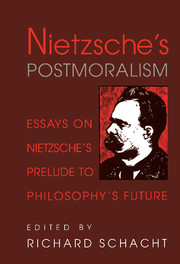Book contents
- Frontmatter
- Contents
- Contributors
- Preface
- A Note on References
- Introduction
- Nietzsche on the Illusions of Everyday Experience
- Masters without Substance
- Rethinking the Subject: Or, How One Becomes-Other Than What One Is
- The Youngest Virtue
- Morality as Psychology, Psychology as Morality: Nietzsche, Eros, and Clumsy Lovers
- On the Rejection of Morality: Bernard Williams's Debt to Nietzsche
- Nietzsche's Virtues: A Personal Inquiry
- Nietzschean Normativity
- Nietzsche's Perfectionism: A Reading of Schopenhauer as Educator
- Bibliography
Introduction
Published online by Cambridge University Press: 20 May 2010
- Frontmatter
- Contents
- Contributors
- Preface
- A Note on References
- Introduction
- Nietzsche on the Illusions of Everyday Experience
- Masters without Substance
- Rethinking the Subject: Or, How One Becomes-Other Than What One Is
- The Youngest Virtue
- Morality as Psychology, Psychology as Morality: Nietzsche, Eros, and Clumsy Lovers
- On the Rejection of Morality: Bernard Williams's Debt to Nietzsche
- Nietzsche's Virtues: A Personal Inquiry
- Nietzschean Normativity
- Nietzsche's Perfectionism: A Reading of Schopenhauer as Educator
- Bibliography
Summary
“The time for me hasn't come yet,” Friedrich Nietzsche observed in Ecce Homo, near the end of his all-too-brief productive life. “Some are born posthumously.” That certainly was true enough when he wrote it, in 1888, years before his writings began to attract any real attention. But attract it they eventually did, on a scale few other philosophical writers have ever even imagined. No other figure in the history of philosophy surpasses Nietzsche in the attention now being accorded to him, not only by scholarly specialists, but also by those engaged in many areas of ongoing inquiry in philosophy and kindred disciplines.
Moreover, no previous figure in the history of modern philosophy has attracted as much attention as Nietzsche has in intellectual circles beyond the bounds of academia, in which cultural analysis and criticism are pursued by many writers concerned with the current problems and future prospects of our society and culture. For some, he is the philosopher they love to hate, who called into question everything they hold dear, and was the sower of many of the ill winds whose whirlwind progeny now threaten us. For others, he is the welcome scourge, liberator, and herald who broke the grip of moribund traditions and stultifying institutions and pointed the way toward a radically new and different future not only for philosophy but also for humanity.
- Type
- Chapter
- Information
- Nietzsche's PostmoralismEssays on Nietzsche's Prelude to Philosophy's Future, pp. 1 - 6Publisher: Cambridge University PressPrint publication year: 2000



